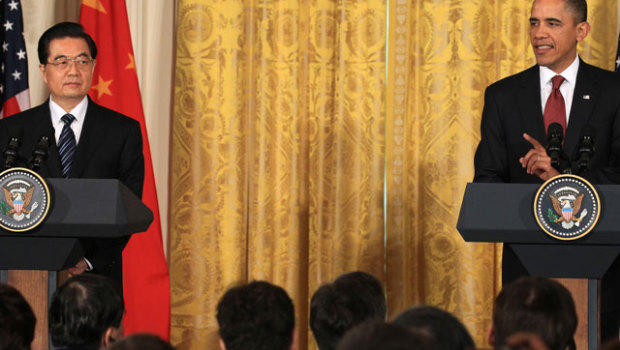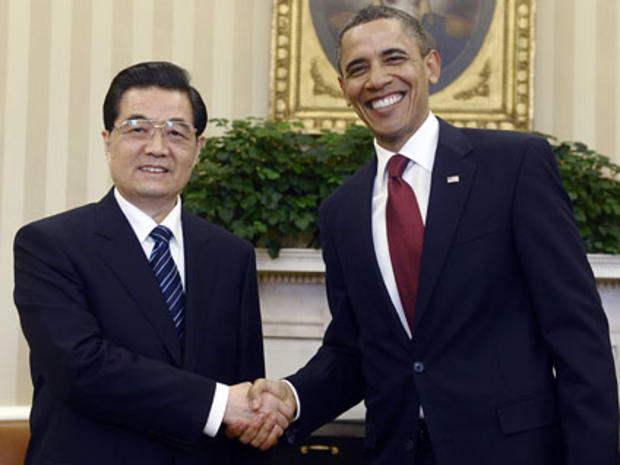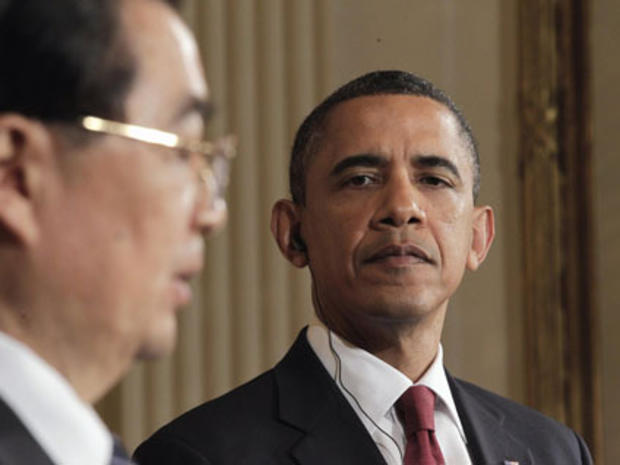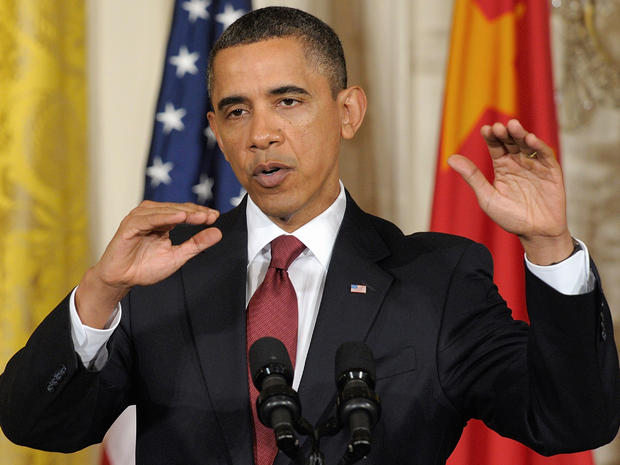Obama: China's Human Rights Record "Source of Tension"
Updated 3:09 p.m. Eastern Time
President Obama said at a joint press conference with Chinese President Hu Jintao Wednesday that China's human rights record remains an occasional "source of tension" between the two countries -- but maintained it "doesn't prevent us from cooperating."
With the two presidents standing side by side at the White House, Mr. Obama was asked by a reporter how America can work with "a country known for treating its people so poorly, using censorship and force to repress its people." The reporter also asked Hu to defend China's human rights record. China has a record of jailing dissidents for questioning their government, including recent Nobel Peace Prize winner Liu Xiaobo.
"China has a different political system than we do," Mr. Obama said in response to the question. "China is at a different stage of development than we are. We come from very different cultures and with very different histories. But as I've said before and I repeated to President Hu, we had some core views as Americans about the universality of certain rights, freedom of speech, freedom of religion, freedom of assembly that we think are very important and transcend cultures. I have been very candid with President Hu about these issues."
He went on to say that "we can engage and discuss these issues in a frank and candid way, focus on the areas where we agree, while acknowledging there are going to be areas where we disagree."
"I want to suggest that there has been an evolution in China over the last 30 years since the first normalization of relations between the United States and China, and my expectation is that 30 years from now we will have seen further evolution and further change," he continued. "And so what my approach will continue to be is to celebrate the incredible accomplishments of the Chinese people, their extraordinary civilization, the multiple areas in which we have to cooperate not only for the sakes of our countries, but for the sakes of the world, to acknowledge we are going to have certain differences and to be honest as I think any partner needs to be honest when it comes to how we view many of these issues. And so that frank and candid assessment on our part will continue. That doesn't prevent us from cooperating in these other critical areas."
Following Mr. Obama's comments, Hu listened to a translation of the exchange but did not respond to the question. He was later asked by another American reporter to answer.
Hu allowed that "a lot still needs to be done" on human rights in China. But he also said that the discussion with the U.S. on the issue needs to be held in the context of "mutual respect and the principle of noninterference" into internal affairs.
"China is always committed to the protection and promotion of human rights," Hu said, according to an interpreter. "And in the course of human rights, China has also made enormous progress recognized widely in the world. China recognizes and also respects the universality of human rights and at the same time, we do believe that we also need to take into account the different national circumstances when it comes to the universal value of human rights. China is a developing country with a huge population and also a developing country in a crucial stage of reform."
Hu added that China "still faces many challenges in economic and social development."
"And a lot still needs to be done in china in terms of human rights," he said. "...China is willing to engage in dialogue and exchanges with the United States on the basis of mutual respect and the principle of noninterference in each other's internal affairs. In this way, we will be able to further increase our mutual understanding, reduce our disagreements and expand our common ground."
Obama Praises Jon Huntsman, Jokes about Possible 2012 Rivalry
Obama: "We Welcome China's Rise"
China's President To Get Grand State Dinner
In his opening remarks, Mr. Obama said the two countries had "agreed to move ahead with formal dialogue on human rights, to advance the rule of law." He also pointed specifically to Tibet, which seeks independence from China. The United States' meetings with the exiled Dalai Lama have been a source of tension between the two countries stating,
"As the United States recognizes Tibet as part of the People's Republic of China, the United States suggests dialogue between China and the Dalai Lama to resolve differences in preserving the religious identity of the Tibetan people," he said.
The press conference was an unfamiliar setting for Hu, who is not accustomed to challenging questions from reporters. It took place after the two leaders spent much of the day meeting with each other as well as a group of business leaders. They are scheduled to participate in a former state dinner at the White House Wednesday evening.
In addition to human rights, other sources of tension between the two countries include China's claim to Taiwan, its relatively laissez-faire attitude toward North Korea, trade barriers for U.S. companies in China, work to address climate change, and the Chinese valuation of its currency, the Renminbi.
In his remarks, Mr. Obama stressed the importance of China as an importer of U.S. goods,
stating that the United States exports $100 billion each year in goods
to the country, which that supports half a million American jobs. He celebrated new trade deals he said would support another 235,000 U.S. jobs.
But Mr. Obama, speaking of meetings earlier in the day, also made clear that he had told Hu he believes China's currency remains undervalued.
"We discussed progress toward a more market orients economy in China and a balanced economic global economy," he said. "This means boosting economic demand in China. I told president Hu we welcome China's increasing flexibility of the currency. That it remains undervalued and there needs to be further adjustment in the exchange race. This could be a powerful tool. We'll continue to look for the value of china's currency to be increasingly driven by the market to ensure no nation has an undue economic advantage."
Mr. Obama added later: "The Chinese government has intervened very forcefully in the currency markets. They've spent $200 billion just recently, and that's an indication of the degree to which it's still undervalued. President Hu has indicated he's committed towards moving towards a market-based system and there has been movement, but it's not as fast as we want."
He also said that he pushed Hu on the fact that trade "has to be fair," adding that "I welcomed his commitment that American companies will not be discriminated against when they compete for Chinese government procurement contracts." The president said his Chinese counterpart vowed to do more to combat intellectual property theft.
Hu pointed to a "deepening mutual trust" between the two countries.
"We will work with United States and other country to effectively address global challenges such as meeting the climate challenge, terrorism, transnational crime, energy and resource security, public health security and serious natural disasters to forge a bright future for the world," he said. "I stated to the president that China is firmly committed to the path of peaceful development and a win-win strategy of opening up. China is a friend and partner of all countries and China's development is an opportunity for the world."



